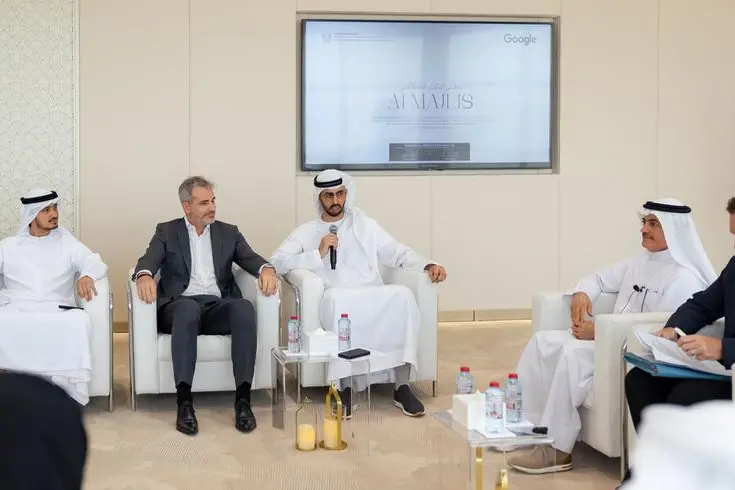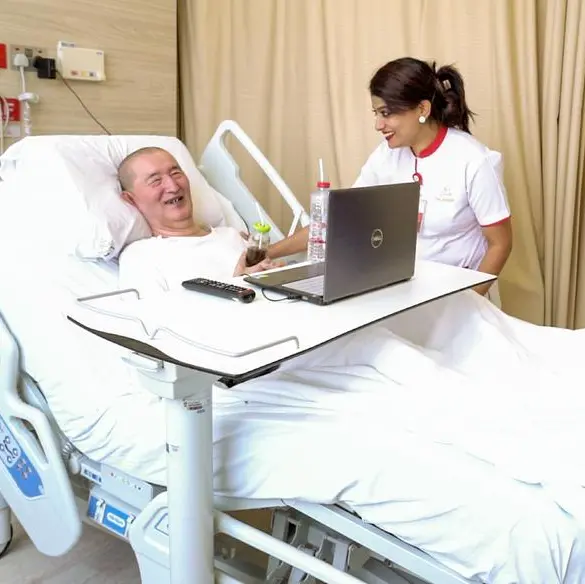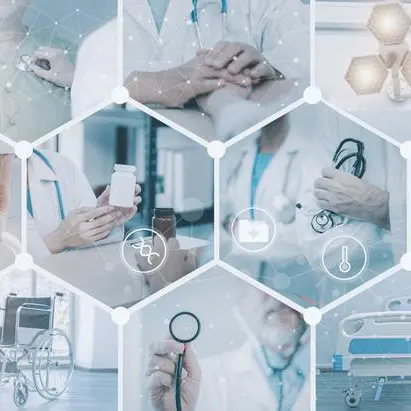PHOTO
Omar bin Sultan Al Olama, Minister of State for Artificial Intelligence, Digital Economy, and Remote Work Applications, emphasised the importance of expanding the scope of specialised dialogues in studying the impacts of artificial intelligence on vital sectors and its role in radically developing these sectors to shape a new landscape that integrates artificial intelligence into all work methodologies and life domains, contributing to shaping the future that the UAE, led by President His Highness Sheikh Mohamed bin Zayed Al Nahyan and under the directives of His Highness Sheikh Mohammed bin Rashid Al Maktoum, Vice President and Prime Minister of the UAE and Ruler of Dubai, seeks to achieve. This transformation aims to solidify the UAE's leadership in the global digital race.
This came during his opening speech at the beginning of the second session of the 'AI Majlis' series, which focused on employing artificial intelligence in healthcare development. The sessions were organised in collaboration between the Artificial Intelligence, Digital Economy, and Remote Work Applications Office, and Google, as part of an initiative aimed at bringing together the government, academia, and the private sector for in-depth dialogues on artificial intelligence and its impact on various vital sectors.
Al Olama highlighted the importance of integration of work and objectives between governmental entities, the private sector, and academic institutions, enhancing partnerships and sharing ideas to build opportunities and confront challenges of artificial intelligence development alongside the growth of vital sectors, contributing to maximising the benefits of these technologies and enhancing the well-being in society.
This session of the AI Majlis series focused on exploring new frontiers in healthcare with artificial intelligence. A specialised dialogue session was held, attended by Dr. Amin Hussain Al Amiri, Assistant Under-Secretary of Health Regulations Sector at the Ministry of Health and Prevention (MoHAP), and Dr Scott Penberthy, Director of Applied AI and CTO of Healthcare and Life Sciences, Google Cloud, in the presence of government officials, leaders and decision-makers in the fields of healthcare, digitisation, technology, communications, and others.
The session discussed mechanisms for integrating artificial intelligence into healthcare systems and its profound impact on the future of medical practices, as well as how to enhance proactiveness in this field through constructive collaboration between the government and private sectors to formulate innovative solutions and strategies that build upon the transformative potential of artificial intelligence to develop the healthcare sector.
Dr. Amin Hussain Al Amiri, Assistant Under-Secretary of the Health Regulations Sector at the UAE Ministry of Health and Prevention (MoHAP), said, “Integrating artificial intelligence into the healthcare sector provides an opportunity to improve the healthcare system in an integrated manner, from diagnosis to designing treatment plans and facilitating administrative tasks, and this leads to enhancing the patient’s experience and raising the efficiency and quality of health care in record time and with high accuracy. In addition to the role that artificial intelligence plays in enhancing public health programmes and epidemic prevention, surveillance and control. The Ministry of Health and Prevention, in cooperation with the Ministry of Artificial Intelligence, launched artificial intelligence technology to detect tuberculosis in medical fitness tests since 2018, and later multiple technologies were used to detect other diseases such as breast cancer, cardiovascular diseases, all this allows us to take proactive and preventive measures to improve the quality of life of patients. The UAE is considered one of the most prepared countries to use and develop solutions that rely on artificial intelligence, as it has worked to develop electronic medical record systems that link health data and save it on the cloud. The Ministry also uses this technology to improve its services and enhance its customers’ happiness, as work is currently underway on a group of initiatives and projects aimed at automating services. For example, a programme is being developed to read health facilities’ designs and compare them with approved standards using artificial intelligence. The Ministry of Health and Prevention, along with the health authorities in the country, release the necessary legislations and standards to regulate the responsible use of these solutions to ensure their safety and proper utilisation and to protect patients’ health data.”
Dr. Scott Penberthy, Director of Applied AI and CTO of Healthcare and Life Sciences, Google Cloud, said, “AI is the healthcare revolution we've all been waiting for, and it's happening now - powered by nanoscale data, analysed by hyperscale AI. Programmes such as the AI Majlis bring our best AI minds together, working on shared missions. I'm deeply honoured to participate and hope to return soon."
The AI Majlis series focuses on a set of goals aimed at developing the infrastructure related to artificial intelligence applications and providing support, including hosting international experts discussing key topics such as future technologies, the future of work, sustainability, education, healthcare, and other vital sectors centred around human-centric approaches.





















